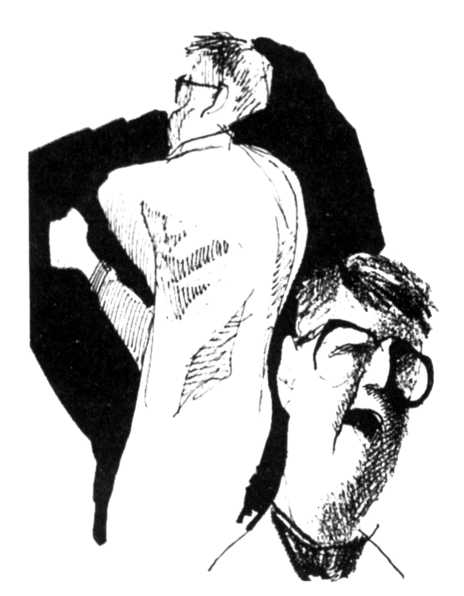Year of the King: An Actor's Diary and Sketchbook - Twentieth Anniversary Edition (16 page)
Read Year of the King: An Actor's Diary and Sketchbook - Twentieth Anniversary Edition Online
Authors: Antony Sher
Tags: #Arts & Photography, #Performing Arts, #Theater, #Acting & Auditioning, #Stagecraft, #Biographies & Memoirs, #Arts & Literature, #Entertainers, #Humor & Entertainment, #Literature & Fiction, #Drama, #British & Irish, #World Literature, #British, #Shakespeare

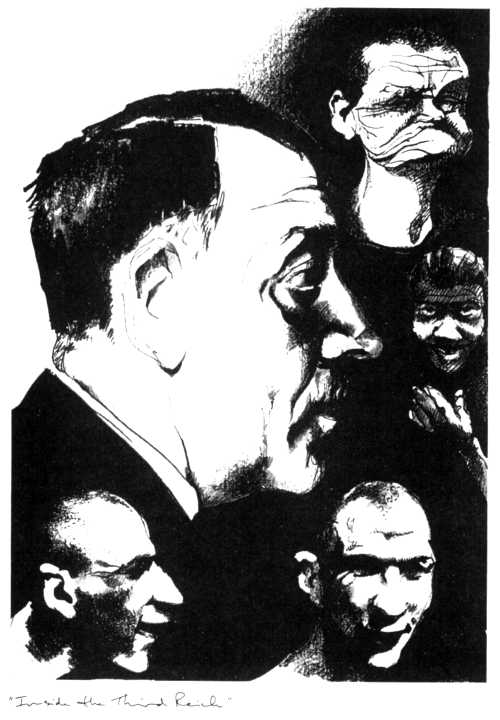
From Mein Kampf: `If we cannot conquer we will drag the world into
destruction.'
From Richard III: `March on! Join bravely. Let us to it pell-mell - If
not to Heaven, then hand in hand to hell!'
After the failed assassination attempt they filmed the executions of the
conspirators (particularly gruesome - they were hung with piano wire
from meat hooks) for Hitler to watch on his own. Richard must do
something equally kinky with Hastings' head.
Also footage of the mentally ill whom the Reich tried to eliminate as
part of their programme to purify the race. Richard's appearance should
make you gasp like these faces. Perhaps ears are the answer to the
make-up. Can make the face look very odd and lopsided, and would
hardly interfere with the acting.
Mal rings to say he's decided to do the season. Great relief.
Charlotte has arranged two research trips for the next two days: today to
a spastics' work centre, tomorrow to a disabled games group.
Driving to pick her up in Chiswick, a strange coincidence: I round the
corner to see a badly disabled man struggling along the pavement, his
walk a weaving dance. I screech to a halt, whip out my sketch pad and,
from my rear-view mirror, begin drawing furiously. A woman standing at a bus stop bends down and peers into my car suspiciously. I fumble for
my A-Z and disguise my sketch within it, while pretending to be lost. The
disabled man passes. I sketch him from behind as he struggles on. Looks
rather like the crippled man in Satyricon. The effort of walking is so
extreme that it's as if the body is all disconnected. He has to sit on a low
wall to rest. An attractive blonde woman passes him. He says something
and reaches for her. She breaks into a little run.
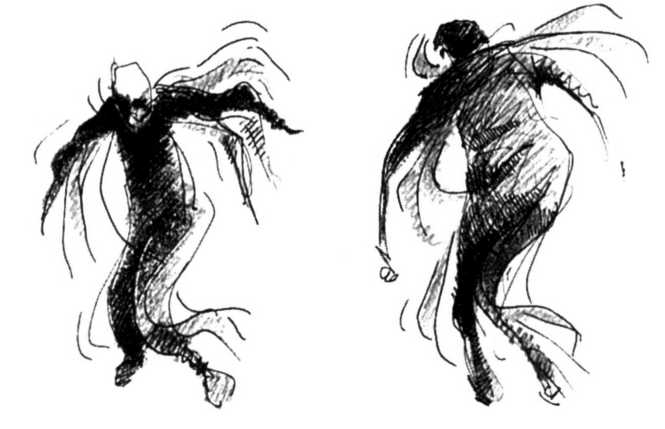
Lady Anne?
CENTRAL MIDDLESEX WORKS CENTRE A small pre-fab building on
a rather bleak hill near Pinner. It's run by Barrie Knight. He is very
impressive to meet. Caring, patient, listens carefully. He tells us his own
story: no medical training, was an engineer, only got interested in the
subject when his own son was born spastic. Eventually led to running this
place where his engineering skills are used in adapting machines for the
spastics to operate. They come here daily and are paid wages.
He explains what the term `spastic' means: damage to the brain before
it is fully developed, causing physical and/or mental disability. The muscles
don't behave in their normal way; the voice is often but not always affected.
The initial damage is caused either by a lack of oxygen at birth or by the
baby falling or being dropped at an early age. He mentions that spastics'
hands are very distinctive, they develop extreme flexibility and their grip
might be more intense and vice-like than a normal person.
Some of this is feasible for Richard.
Against my better judgement it has been agreed that, if questioned, I
shouldn't declare my reason for being here but should say that I'm a
friend of Charlotte's, who is a physiotherapist. My natural squeamishness
makes me apprehensive as we head for the work area. `And be careful,'
Barrie whispers, `they're all very good lip-readers.'
Charlotte's medical training enables her to plunge straight in, going
round the benches chatting, asking what they're making. I start to follow
nervously when a hand shoots out and grabs my arm. `Good,' whispers
Barrie, `now you'll see what I mean about the grip.' And he leaves me.
It's a baptism by fire. The grip belongs to Michael, one of the most
severely handicapped people in the room. Scrunched in his wheelchair,
head lolling back, teeth gnashing, mouth grimacing (almost grinning) with
the effort to speak, saliva dripping freely on to his jumper. I say, `Hello.
What are you making?' On his bench is a little machine that presses screws
through black rubber washers. He gives me a demonstration. With hands shaking and jerking, mouth biting and chewing, he struggles to get the
items into place on the machine. Each time he succeeds he accidentally
knocks them away again. I could so easily reach down and do the job in
two seconds. At last it's done - a black rubber foot with a screw through
it rolls out of the press and joins the little pile that is his morning's work.
He sits back panting and smiling. His dark eyes are bright.
I move on. It gets easier. A lot of them smile very readily, their grins
are infectious, cheeky. One man works a large noisy machine and has to
wear a special mask and goggles because of the dust. `And these?' I shout
over the din, pointing at his ear-pieces, `Are they for the noise?' He lifts
his jacket to show a Sony Walkman, and grins.
A man in a wheelchair beckons us over, whispers conspiratorially, `I've
got a walking frame as well, but I'm back in the wheely today, they say
I'm getting too independent.'
But one figure is disturbing. He has been silently following us since we
came in, watching from behind the pillars.
Trying to keep any panic out of my voice, I ask
Barrie about him. He turns out to be titled aristocracy,
or more accurately, has just inherited the family title
after his father's recent suicide. The father was a
high ranking army officer. The only outings he had
as a child were to the barracks - hence the upright
bearing. The rest of the time he was hidden away by
two aunts in a back room of their house. Now they
have died as well and he has come here. But Barrie
fears that too much isolation has taken its toll.
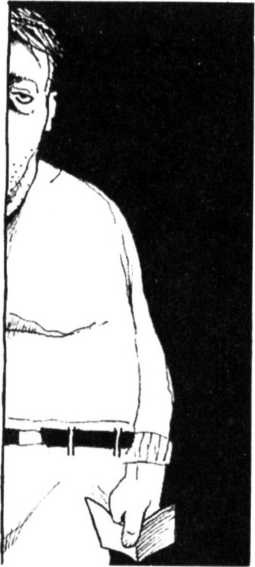
He is seated at his place now, head occasionally
moving from side to side as if repeating `No' slowly.
I glance over his shoulder at the little book which he
constantly carries. It's an appointments diary, with no
entries. He looks up at me. I risk a smile. Much to
my surprise his face lights up briefly, he grins and
looks away bashfully.
We get into conversation with a middle-aged man
working a much more complicated machine than the
others. He is angry: `I'm not mental. Like a lot of
them in here. So there's no one to communicate with.
Have to keep to myself.' His speech is badly impaired
and his movements convulsive, but there is a constant struggle to control it. When saliva threatens to slip out of his mouth
he'll toss his head back and swallow it rather than permit any further
degradation. He is proud of his blue jumper with red deers which he
knitted himself, and of the fact that at home he has to look after his sister
who has a bad heart condition. `Life is unfair,' he says.
As we are about to move on he says to me, `I know you. I know your
face.'
`Really?' Try to remain relaxed. Ile probably watches television and has
seen me in The History Man or something. But I'm hardly ever recognised.
`I can't think where I've seen you,' he says.
`I used to come for treatment at St Vincent's up the road. I had a leg
injury a couple of years ago. Perhaps it was round there.'
`Perhaps,' he says, staring hard.
`Anyway, see you, good luck.' I hurry away, wishing I'd insisted on
being open about why I'm here.
Run straight into more problems with a lady called Carol. Her job is
counting brass plates. `Count 'em in my sleep,' she says grinning. She has
large beautiful eyes and a radiant smile. Her small body is strapped tightly
into her wheelchair, where it arches and struggles as if independent of
her head.
`Did you have a holiday last year?' she asks.
`Well actually yes, I went to South Africa for Christmas.'
`Are you from there?'
`Yes I am, originally.'
`I knew it!' she cries delightedly, 'I knew you weren't English.'
`Oh?' I say, a bit miffed.
`Have you been to Israel?' (My God, she's on to my Jewish past as well.)
`Yes I have.'
`Did you like it?'
`No, I didn't.'
`I want to live there.'
`Really.'
`What do you do?'
`Well, Charlotte's a visiting physiotherapist and I'm a friend of hers.'
`Is that your profession?'
I laugh nervously. 'No, I'm an artist.'
`Where do you work?'
'I ... work at home. I'm a freelance artist.'
To prove my alibi I take out my sketch book, go into a corner of the
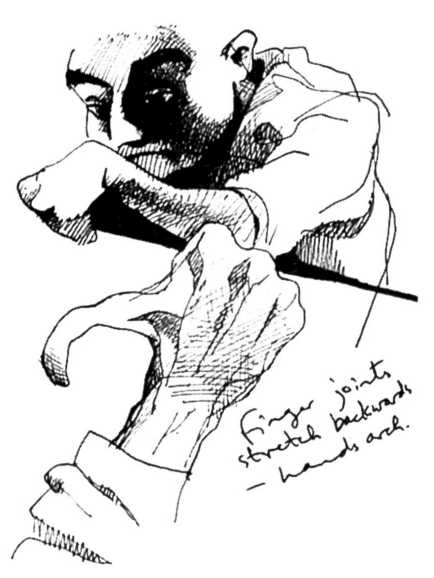
room and start sketching. Barrie had said this would be all right. No
one takes any notice, except Carol, who keeps grinning at me, almost
flirtatiously.
At 12.30 it's lunch time. They file out, a procession of strange walks
that I would not dream of inventing. One walks as if treading water;
another with splayed feet, the gait as if drunk; one has a walking stick
with a splayed claw at the end - I could use that in the play.
Last out is the man who boasted about his walking frame - he has
asked to be allowed to go to lunch on it, specially to show us. He moves
past painfully slowly but with great pride. We stand nodding and smiling
as if taking a salute. He turns into the corridor and we hear a terrible
crash. We rush out to find him lying entangled in his walking frame,
struggling. Charlotte is calm and professional: `Oh dear - still, probably
not the first time, how do you get up best?' He grins and puffs and says
`Not to worry', hauling himself up a series of rails along the wall. One of
Barrie's assistants comes rushing down the corridor with this man's
wheelchair, virtually scoops him into it and drives him off to lunch
muttering `Told you so ...'
